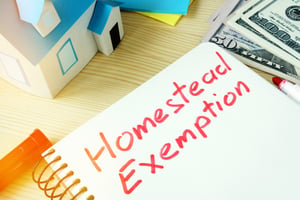 There are different times throughout the year where you prepare to spend a little bit extra, and there are other times when you tighten up to save a little extra. Around the holidays, it’s easy to add a few things to Santa’s list. Planning a vacation this summer, you may choose to cut out certain discretionary expenses to save extra money. While the holidays are typically a time when we spend a little more than usual, it is important to also think of ways to save money during this time. Filing your Homestead exemption is a great way to save money on your property taxes. If you’ve been in your home since January 1st of this year, the timely filing deadline is quickly approaching. But what is a homestead exemption, and how can it save you money? It all starts with property taxes.
There are different times throughout the year where you prepare to spend a little bit extra, and there are other times when you tighten up to save a little extra. Around the holidays, it’s easy to add a few things to Santa’s list. Planning a vacation this summer, you may choose to cut out certain discretionary expenses to save extra money. While the holidays are typically a time when we spend a little more than usual, it is important to also think of ways to save money during this time. Filing your Homestead exemption is a great way to save money on your property taxes. If you’ve been in your home since January 1st of this year, the timely filing deadline is quickly approaching. But what is a homestead exemption, and how can it save you money? It all starts with property taxes.
Property taxes play a significant role in the cost of homeownership. These taxes are based on the assessed value of your home (which is different than the appraised value of your home). Property taxes fluctuate based on the tax needs and economic climate of where you live. When property taxes increase, so will your tax obligation, and in turn, if you are escrowing your taxes, your monthly mortgage payment will also increase. A homestead exemption may help curtail your property taxes and save you money.
What is a Homestead Exemption?
A homestead tax exemption exempts a percentage of your home’s assessed value or a specific dollar amount from being taxed. This exemption only applies to your primary residence; it cannot be applied to rental or investment properties. Homestead exemptions are available in 46 states. Some state laws allow for a certain percentage of your home’s value to be exempted; other states use a set dollar figure.
How Does a Homestead Exemption Work?
The specific details of a homestead exemption are determined by the District or Parish of your primary residence. As stated above, each state, district, or parish, likely has different rules on how to apply for your exemption. These rules include, when you are eligible to apply, and the specific details of your tax exemption. Some governing bodies even apply the homestead exemption to your property taxes automatically however, in the majority of locations, you have to file your homestead exemption in order to receive the benefit.
For example, in Orleans Parish (Louisiana) you must go to the Assessor Office and present the following:
- Proof of ownership (Act of Sales or Warranty Deed)
- A valid Louisiana Driver’s License or State ID (address must correspond to the property’s address on the application)
- A current unpaid Entergy bill for the property, with service location or mailing address being the same, showing standard residential usage; OR
- A landline telephone bill or cable bill.
Once you file your Homestead Exemption, specifically in Orleans Parish, LA, you will be able to claim an exemption from property taxes for the first $75,000 of value of your primary residence. If you are a disabled Veteran or the surviving spouse of a veteran this amount may be increased.
What does this mean? In our Orleans Parish example, let’s say that your home is assessed with a value of $200,000. The property tax rate where you live is 1.6%. This would result in a property tax bill of $3,200. However, if you were eligible for a homestead exemption of $75,000, the taxable value of your home would only be $125,000, resulting in $2,000 in property taxes, a savings of $1,200.
Other areas use a percentage exemption, for example Harris County, Texas exempts 20% of your County property tax. This means if your primary residence is assessed at $200,000 your County property taxes would only be assessed on $160,000 of total value rather than the full $200,000. As you can see, Homestead exemption percentages and dollar amounts as well as the process to file your exemption vary by state and district or parish.
When Should You File for a Homestead Exemption?
To be eligible to apply for a homestead exemption, you must own and occupy your home as your permanent residence by January 1st of that filing year. The deadline to timely filer your exemption may vary by state, county, or parish. Contact your local assessor’s office for specific filing details.
The homestead exemption tax credit can be very beneficial. If you are considering buying a new home, or your first home, property taxes should be a key consideration as you shop. The expert loan officers at Standard Mortgage (NMLS#:44912) have been helping homeowners and homebuyers for over 90 years.





